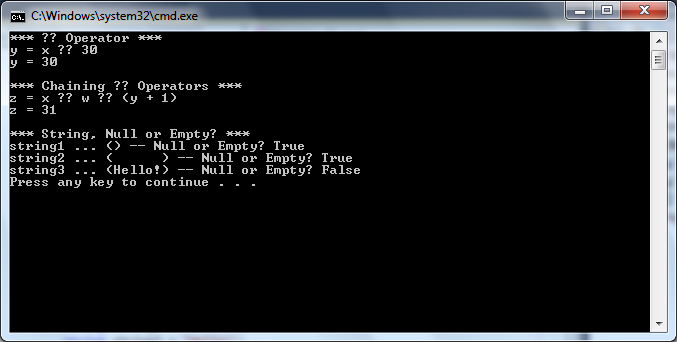Random C# Tricks
I wanted to share a few C# tricks I reviewed today. Some programmers will use them all the time, others barely know about their existence.
In this short source code example I will be demoing the ?? operator, chaining ??, and String.IsNullOrWhiteSpace() which is a newer .NET method.
So here is the source I’ll talk about:
using System;
namespace C.Sharp.Tricks
{
class Tricks
{
static void Main(string[] args)
{
/*** ?? Operator ***/
// Allow x to be null by using 'int?'
int? x = null;
// Set y = x if not null, otherwise use 30 for a value
int y = x ?? 30;
// Print the results to screen
Console.WriteLine("*** ?? Operator ***");
Console.WriteLine("y = x ?? 30\ny = {0}\n", y);
/*** Chaining ?? Operators **/
// Set z = x if not null, else if w not null, else y + 1
int? w = null;
int z = x ?? w ?? (y + 1);
// Print the results to screen
Console.WriteLine("*** Chaining ?? Operators ***");
Console.WriteLine("z = x ?? w ?? (y + 1)\nz = {0}\n", z);
/*** String, Null or Empty (Whitespace)? ***/
// Make a null string, empty string (spaces), and one with 'Hello!'
string string1 = null;
string string2 = " ";
string string3 = "Hello!";
// Print the results to screen
Console.WriteLine("*** String, Null or Empty? ***");
Console.WriteLine("string1 ... ({0}) -- Null or Empty? " +
String.IsNullOrWhiteSpace(string1), string1);
Console.WriteLine("string2 ... ({0}) -- Null or Empty? " +
String.IsNullOrWhiteSpace(string2), string2);
Console.WriteLine("string3 ... ({0}) -- Null or Empty? " +
String.IsNullOrWhiteSpace(string3), string3);
}
}
}
The ?? operator is a simple way to set a variable to something, and if that first condition is null it will fallback to a second value. So since x is null, y will end up being set to 30. The program outputs the expected result to prove that.
Next we will chain the ?? operators together. In my example both x and w are null, so z will have to be set to (y + 1), or 31. The program again prints the expected result to screen.
The benefit that ?? brings to the table is that it turns what could have been a complicated if/else statement, into a logic one-liner. It is also a nice convenience since you can write code that may or may not have to deal with an uninstantiated variable at runtime very easily.
Finally, I have a block of code that shows how the new String.IsNullOrWhiteSpace() method from .NET version 4 works. Basically, the method returns true if a given string is null, or just a bunch of whitespace; otherwise it will return false. So I send in a null, a string with just spaces, and a string with a phrase and I print the expected results to screen. This method could be helpful to determine if the user entered in a space or spaces when in reality it should have been sent in as null or just empty.
Here is a screenshot of the running program:
I found these either new or exciting to use today, and I hope you can find interesting ways to incorporate them in your software design!
